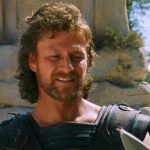By Anna Jeffries-Shaw, Year 12.
In the following post, Anna hopes to make you question the concept of heroism by exploring the characters of two of the most famous heroes from the Ancient World: Achilles and Odysseus.
Heroes are prevalent in everyone’s life. Whether your hero is a real person or a character from a movie, someone close to you or someone you have never met, everybody has some sort of hero or role model. The concept of a hero, however, has existed for millennia, dating back to Ancient Greece. Here, we discover some of the most famous heroes to have existed: Hercules, Hector, Aeneas, Perseus, Theseus, Jason, and Atalanta (curiously the only female who repeatedly makes lists about the top heroes in Greek mythology). And of course, arguably two of the most famous men and heroes of history: Achilles and Odysseus.
Before it is possible to begin to tackle the question of which of these men was the greatest hero, it is first necessary to explore the even greater question of what constitutes a hero. The OED defines a hero as ‘a person who is admired for their courage, outstanding achievements, or noble qualities’. In other words, a role model. In Greek tradition, however, a hero was a human, who was endowed with superhuman abilities by virtue of being descended from an immortal god. A hero in that era would not have any of the additional connotations we’ve come to expect of moral worth, valour and so on. In fact, the Greek word ‘ἥρως’ (pronounced ‘heros’), which is usually translated as hero, actually means just a ‘warrior’. And so this debate seems futile, in a sense, as expecting ‘heroism’ of either Achilles or Odysseus – to expect them to conform to any of our ideas of what a ‘hero’ is – is an anachronism.
Nevertheless, it is a topic worth exploring: which man was more heroic?
Achilles: the hero of the Iliad. Brutal, vain, pitiless… and thus a true hero. He does not fit modern conventions of morality. He is a killer, a rapist, a plunderer. He is temperamental, which has dire consequences right from the beginning, revealed by the opening lines of the Iliad:
“Anger be now your song, immortal one,
Achilles’ anger, doomed and ruinous,
that caused the Achaeans loss on bitter loss.”
(Translated by Robert Fitzgerald)
He can be pitiless, and he can be murderously cruel. Yet there is still something fundamental about him to which we can all relate. He may be an original Byronic hero, fitting the description of the literary character named after Lord Byron, a poet who was part of the Romantic movement in literature, before the term was even coined. The Byronic hero is usually dark and moody, sexually intense, mysterious, emotional troubled and arrogant and Achilles is all these things. He is expected to perform numerous heroic deeds, yet he disagrees, complains, and is willing to go to any length just to prove he’s right. He’s not necessarily the kind of person one wants to be, but certainly the kind of person one can relate to.


Left: Brad Pitt as Achilles in Troy (2004) Right: Sean Bean as Odysseus in Troy (2004)
Contrasting to the seemingly brutish Achilles is Odysseus, the hero of the Odyssey, which begins thus:
“Sing to me of the man, Muse, the man of twists and turns
driven time and again off course, once he had plundered
the hallowed heights of Troy.”
(Translated by Robert Fagels)
His key feature is his cunning. He is not primarily a rash or fierce hero, although his physical strength and other conventional aspects of Ancient Greek heroism are not to be overlooked. Odysseus is a multi-faceted hero. He is ‘πολυτροπος’ (pronounced ‘polutropos’). This is translated in a variety of different ways, with different implications. In the Fagels translation above, it is rendered as ‘man of twists and turns’, in others ‘the man of many ways’. Yet the underlying message about his character is evident: he can morph into a wide variety of different identities. And for what? In order to survive. It is his cunning, ultimately, that leads to the sacking of Troy as a result of the legendary Trojan Horse. It is ironic that Achilles, whose physical power was not able to destroy Troy, gets to be the number one hero of the Iliad, and not Odysseus, who succeeded where Achilles failed. Odysseus is seemingly incomparable; his fame cannot come from the fall of Troy.
Whilst it is seemingly impossible for either to fit our modern sensibilities of heroism, both hold elements. Many have questioned, of Achilles, whether kindness, altruism, generosity, and modesty were just seen as weaknesses to the fierce and brave exterior. In fact, Achilles spares Priam’s life in book 24 of the Iliad, returning Hector’s body and even calling him ‘dear old man’. Is this kindness? His genteel character may be seen in his relationship with Patroclus, which is explored in Madeline Miller’s ‘Song of Achilles’ and in which Achilles and Odysseus are shown to be the only two characters who can maintain loving relationships.
Instead, we must consider two key elements central to heroism in this era: ‘kleos’ and ‘nostos’. ‘Kleos’ literally translates as fame and glory, whereas ‘nostos’ is described as a ‘song of safe home coming.’ It is Achilles’ destiny to chose between the two in the famous prophecy: he must either die a glorious death at a young age, or live until old age unfruitfully. He choses the former; he chooses to have kleos. On the other hand, upon Odysseus’ return to Ithaca, in disguise, it will take him a long time before he can prove to everyone that he really is the King of Ithaca, to re-establish his identity and ultimately achieve nostos. However, he is seemingly one above Achilles in this way: he attains his kleos from his nostos.
Both of these heroes are undeniably human men with the capacity for goodness, love and bravery. And whilst I believe Odysseus to be the greater hero, it is a debate that can never be settled simply because no one can know definitively what a hero is.
Follow @Classics_WHS on Twitter

